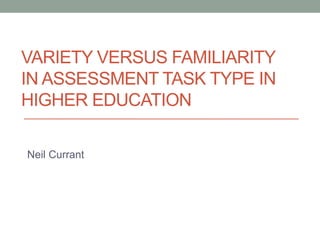
Nc fslt15 virtual conference
- 1. VARIETY VERSUS FAMILIARITY IN ASSESSMENT TASK TYPE IN HIGHER EDUCATION Neil Currant
- 2. Assessment task type • At university, freedom to set a range of different assessment task types, examples include: MCQ, exam, essay, laboratory report, field work, literature review, dissertation, website, skills observation, report, case study, proposal, design brief, physical artifact, video, presentation…the list is almost endless BUT Is that variety a good thing?
- 3. Tension between variety versus familiarity in assessment task types • Arguments for familiar assessment task types: • Students need to practice and be familiar with assessment types to do well (e.g. TESTA 2010, Race 2010) • Feed-forward & linked assignments – students get feedback that is obviously useful to the next task (e.g. Gibbs 2015) • Arguments for a variety of assessment tasks types: • Multiple means of expression to allow students to demonstrate what they know in the best way they can (CAST 2011)
- 4. In other words… • A balance between … • Too many task types that confuse students and mean they might perform badly due to not understanding the task type versus too many of the same type of task (e.g. essay) disadvantaging certain students who perform better at other task types.
- 5. My context for investigating this issue • Module X –2 assignments - variety: one multimedia, one essay. • Module Y – Has an assignment in three parts – familiarity: same task type.
- 6. Data from module X - variety • Significant correlation between performance on both assignments. (significant at 0.01 level, rho=0.459, Spearman two- tailed). • However, if we consider the multimedia assignment as offering the variety from the more traditional essay: • 21 students did better by 10 marks (one grade boundary) or more on the multimedia assignment (i.e. were advantaged by variety) by an average of 13.3 marks • 14 students did better by 10 marks or more on the essay (i.e. were disadvantaged by variety.) by an average of 11.8 marks [N=120]. • [NB: the mark profile for each assignment was not significantly different, i.e. each assignment got similar marks overall.]
- 7. Reflection and informal feedback on variety • Multimedia assignment enjoyable to mark and generates some fantastically creative work. • Students seem to engage with the multimedia task. • No student has complained about the variety in formal or informal feedback. • The multimedia assignment helps to develop students digital literacy. • Those who make use of formative feedback (on a draft) produce better multimedia assignments.
- 8. Conclusion about variety • That 30% of students did better by one grade boundary or more on one assignment compared to the other suggests variety of assessment type is important to not disadvantage certain students. • More students gained from having the multimedia assignment than lost from not having two written assignments which suggests keeping the variety of assessment types on this module.
- 9. Emerging data from module Y • Only first two parts have so far been completed. Part a is marked and then students are given feedback that can be directly used in part b. 0 2 4 6 8 10 12 did better on b did the same did worse on b • Those that did worse had all achieved a distinction on part a. 0 1 2 3 4 5 6 7 8 9 avg increase if < 70 in part a avg increase I f> 70 in part a Who got better marks on part b Improvement in part b (based on part a mark)
- 10. Reflections and conclusions on familiarity • Linked assignments most benefited students who had lower marks to start with. • I noticed that certain students (particularly those from less experienced and art backgrounds) struggled a bit with academic writing. • It was obvious when marking part b that most students had attended to the feedback from part a and had attempted to address specific feedback items. • I am convinced linked assignments have been beneficial to students on this module and will keep this idea (I have to admit I wasn’t so convinced at the start of the module!)
- 11. Implications • From my modules it appears that: • Familiarity works (most notably because of the feedback, e.g. see Nicol & Macfarlane-Dick 2006) • But that variety is also beneficial. • Need to design modules / courses to include both elements. • This evaluation highlights the huge importance of feedback regardless of assessment task type.
- 12. Action plan • Maintain and encourage the use of drafts / formative feedback for module X. • Modify Module Y assignment to allow / encourage greater means of representation (CAST 2011) particularly for those from more practical disciplines.
- 13. References • CAST (2011). Universal Design for Learning Guidelines version 2.0. Wakefield, MA • Gibbs, G. (2015) 53 Powerful ideas no.27: Making feedback work involves more than giving feedback. SEDA: London • Nicol, D. & Macfarlane-Dick, D. (2006) Formative assessment and self- regulated learning: A model and seven principles of good feedback practice. Studies in Higher Education (2006), Vol 31(2), 199-218 • Race, P. (2010) Making Learning Happen, Sage: London • TESTA (2010) Principles of Assessment, Transforming the Experience of Students through Assessment: University of Winchester
